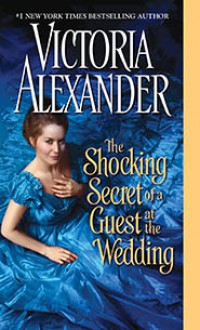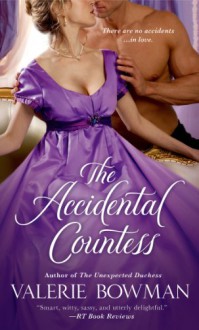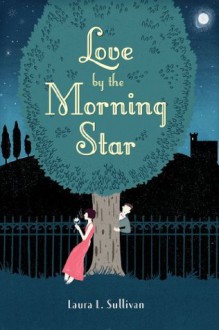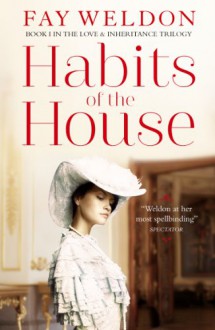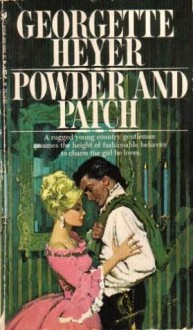
Powder and Patch (The Transformation of Phillip Jettan) is the sixth book I've read by Georgette Heyer, and I'm beginning to understand more and more why she is such a beloved treasure for so many readers. She has quickly carved out a place in my heart for creating such wonderful characters like Venetia, Damerel, and Aubrey (Venetia); Roxhythe and Chris (The Great Roxhythe); Prudence, Robin, Lord Anthony Fanshawe, and "the old gentleman" (The Masqueraders); Horry and Rule (The Convenient Marriage); and particularly Freddy Standen and Kitty Charing (Cotillion). If you haven't tried Heyer yet, well, what are you waiting for? There's something there for everybody.
Powder and Patch's tag line could be: Be careful what you wish for, you just might get it. Old Tom Jettan wished there'd some day be a Jettan male who wasn't a "wild fellow at heart." Old Tom's eldest son and Phillip's father, Sir Maurice Jettan, wishes his son weren't such a "damned dull dog." Cleone Charteris, the Vision of Little Fittledean, though she professes to be in love with Phillip, wishes he weren't so "distressingly boorish." He's "masterful" and "handsome", but his "speech was direct and purposeful", his compliments were not flowery, and his clothes were chosen for "comfort" rather than fashion. Why, he even has the effrontery to prefer his own chestnut locks neatly brushed and "tied loosely at his neck with a black ribbon" instead of a scratchy wig. What a bumpkin!
What does Phillip wish for? Well, certainly not a Grand Tour. Definitely not the labyrinthine scheming of court life. And London? Why, the Big City bores him to tears. Grandpa Jettan must be dancing a jig wherever he is because Phillip is his wish come true. Phillip is a simple honest country boy without one ounce of artifice who enjoys being a gentleman farmer at Jettan's Pride. He's also "head over ears" in love with Cleone Charteris and his life would be perfect if someday she would consent to be his wife. But Fate must have been feeling particularly irritated with his complacency and sends The Apparition to shake up Little Fittledean, especially Cleone and Phillip.
And lo, unto the lowly citizens of Little Fittledean, a wondrous sight did appear! The Apparition (also known as Mr. Henry Bancroft and former resident of this peaceful little village) decides his childhood home will be a perfect place to hide ou- erm, I mean, rusticate from the rigors of City Life. If it weren't for that Unfortunate Incident involving a dawn appointment with another gentleman, who's languishing at death's door, Little Fittledeanians would never have been graced with his presence. Wearing a pale apricot coat, flowered brocade vest, dazzlingly white small clothes, "stockings (...)adorned by sprawling golden clocks", swinging an "amber-clouded cane", a bejeweled snuff box and a wisp of lacy handkerchief clasped in one pale manicured hand. The Apparition languidly minces down Main Street wishing for some form of Amusement to ease the tedium, high red heels clicking, leaving a trail of children with mouths agape, buxom dames gazing after him with wide eyes, and even the unflappable Sir Maurice flabbergasted at such an awe-inspiring sight. Even Sir Maurice's horse is discombobulated.
Spying his, er, Amusement swinging a basket as she crosses the market place, The Apparition accidentally on purpose runs into an inattentive Cleone Charteris, renews his acquaintance with the "little nymph who so tormented" him when they were children. Soon Cleone is playing Bancroft against Phillip, preening under Bancroft's "pretty phrases", admiring the set of his coat, his powdered wig, his polished nails, and be-ringed fingers, not to mention those high red heels. Bancroft, enjoying wooing Cleone just to watch Phillip twist in the wind, and sensing discord between the couple, sneers at Phillip's comfortable coats and dirty boots, taunts him for his lack of polish, and insults him by openly flirting with Cleone. Phillip is utterly miserable. And angry. And frustrated. And genuinely puzzled. One humiliating duel with Bancroft, a rejected marriage proposal from Cleone, and an unsympathetic ear from his father later, Phillip hies off to Paris to become what Cleone and his father have harangued him about for years — a powdered, painted puppet. Ha! That'll show 'em.
I liked Phillip pre-transformation so much and was distressed that Sir Maurice and Cleone were manipulating Phillip to become what they wanted him to be. It's never a good thing when someone you love says, "I love you, but..." because what comes after the "but" is usually a laundry list of ways you fail to be worthy of his/her love. When Cleone rejects Phillip's marriage proposal, I understood her reasons (even if I didn't like her methods), and my heart broke for Phillip.
"'Cleone,' blundered Phillip, 'you — don't want a — mincing, powdered — beau.'
'I do not want a — a— raw — country-bumpkin', she said cruelly.
Phillip drew himself up.
'That is what you think of me, Cleone?'
Something in his voice brought tears to her eyes.
'I — no — I — oh, Phillip, I could not marry you as you are!'
'No?' Phillip spoke very evenly. 'But if I became — your ideal — you could marry me?'
'I — oh, you should not — ask such questions!'
'As I am — you'll none of me. You do not want — an honest man's love. You want the pretty compliments of a doll. If I will learn to be — a doll — you'll we'd me. Well, I will learn. You shall not be — annoyed by an honest man's love — any longer. I will go to London — and one day I'll return. Farewell, Cleone.'" (42)
But Powder and Patch is, at its heart, a comedy of manners, and knowing this helps in understanding why more weight is given to appearances, like Cleone's coquetry or Bancroft's empty flattery and slavish devotion to fashion, rather than character, like Phillip's faithfulness and his "honest man's love." Once I realized that, I had so much more fun observing the results some of Cleone's boneheaded decisions wrought (hint: becoming betrothed to two men at the same time!), giggling as Phillip transforms from bumpkin to gallant, and enjoying the way Phillip taught Cleone a thing or three about Court gallants, albeit very languidly, of course.
Cleone is foolish, young, a bit shallow, makes a lot of stupid decisions, and annoyed me to no end. But... She's rebelling against Phillip's arrogant sense of ownership, is convinced he's taking her and her love for him for granted. Cleone's demands for Phillip to change or else is her line in the sand. Not surprising then that she wants to shake things up a bit. Though playing one man against another is not the most honest way of "hanging a question mark on the things you have long taken for granted", I understood her desire for Phillip to recognize she was worth the fight.
Six months later, Phillip has transformed from "a raw clodhopper" into the darling of Parisian society, speaking French fluently, in demand by court ladies like La Pompadour, fencing with Guillaume Corvoisier, writing lots of really bad poetry, flirting, and sealing his fate as a cavalier extraordinaire by pinking a jealous husband in a duel. Card parties, bal masques, routs, soirées, drinking to excess, gambling, wooing the ladies — a much different Phillip in appearance and attitude and one who is surprisingly having a great time.
Phillip becoming à la mode was so much fun, especially his reaction to his initial makeover. Gone were his serviceable coats, buckskins, and dirty riding boots. Now he's painted, perfumed, patched, and powdered. He (and I, truth be told) was transfixed by his appearance after Le Marquis de Chatêau-Banvau, Uncle Tom Jettan, and François, his valet were finished:
"He stared and stared again at his reflection. He could not believe that it was himself. He saw a tall, slight figure dressed in a pale blue satin coat, and white small-clothes, flowered waistcoat, and gold-clocked stockings. High, red-heeled shoes, diamond buckled, were on his feet, lace foamed over his hands and at his neck, while a white wig, marvellously curled and powdered, replaced his shorn locks. Unconsciously he drew himself up, tilting his chin a little, and shook out his handkerchief." (55-56)
But it's when he decides the "abominable ruby" on his finger will never go with his ensemble and that he shall wear only sapphires and diamonds that the transformation is complete. Et voila! Le petit Phillippe is born! What began as a rebellion against his father and punctuated with anger and hurt from Cleone's rejection has turned into something joyous and exciting, and he throws himself into the makeover enthusiastically. I couldn't stop chuckling later at how very precise Phillip became choosing coats, vests, stockings, rings, and patches, especially the grey and pale pink ensemble — "pearl-grey breeches," grey ruffled lace, a "very exquisite concoction of pink and silver brocade" for his vest, and pink hummingbirds on his stockings. Truly exquisite! Phillip had such scorn in the beginning for men like Bancroft (and perhaps a little of that, too, for his father and uncle) believing Cleone "worthy a man, not a powdered ruffled beau." After his transformation, Phillip is still just as "masterful" and manly as before but with an additional delicious dimension of elegance and savior faire, and an acknowledgment that Cleone is worth fighting for.
I absolutely love Powder and Patch. I loved it so much that I exercised my very old, very rusty French skills just to translate Phillip's hilariously awful rondeau, "To The Pearl That Trembles In Her Ear", laughing the entire time. I loved it so much that I scoured the internet until I found that elusive Chapter XX removed in 1930 before The Transformation of Phillip Jettan became Powder and Patch. (If you'd like to read that chapter, go here.) Powder and Patch is charming in its wit and repartee and such a fun, funny book. I wallowed around in the meticulously, lovingly detailed descriptions of 18th century fashion and bemoaned the lack of more Georgian historical romances with men in high red-heeled shoes. In the end, the Jettan family adage of "a rakish youth" but "a marriage for love" remains true whether Cleone and Phillip quietly retire to country life in Sussex or become the darlings of Parisian society. Though I do wonder how, or if, Sir Maurice will "keep 'em down on the farm, now that they've seen Paree."

 Log in with Facebook
Log in with Facebook 
